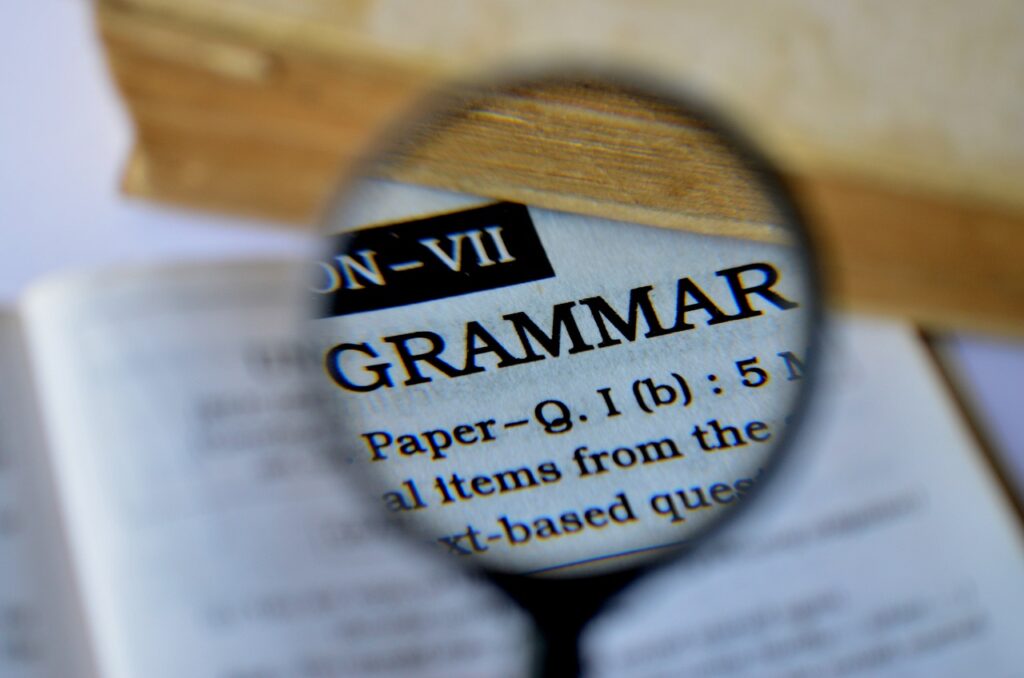Mastering English grammar can be a daunting task, even for native speakers. Whether you’re a student, a professional, or someone simply looking to refine your language skills, understanding and correcting common grammar mistakes can enhance your communication. In this blog, we’ll explore frequent grammar errors and provide tips on how to avoid them.

1. Subject-Verb Agreement Errors
Mistake: “She go to the store every day.”
Correction: “She goes to the store every day.”
Tip: Ensure that the subject and verb in a sentence agree in number. Singular subjects take singular verbs, while plural subjects require plural verbs.
2. Misuse of Apostrophes
Mistake: “Its a beautiful day”
Correction: “It’s a beautiful day.”
Tip: Use “it’s” as a contraction for “it is” or “it has,” and “its” for the possessive form. Apostrophes also indicate possession, e.g., “Sarah’s book.”
3. Confusing Homophones
Mistake: “Their going to meet us there.”
Correction: “They’re going to meet us there.”
Tip: Homophones are words that sound the same but have different meanings and spellings. Common examples include “their” (possessive), “there” (place), and “they’re” (contraction of “they are”).
4. Run-On Sentences
Mistake: “I love to read I have a large collection of books.”
Correction: “I love to read. I have a large collection of books.”
Tip: Separate independent clauses with a period, a semicolon, or a comma followed by a conjunction to avoid confusion and ensure clarity.
5. Fragmented Sentences
Mistake: “Because I was tired.”
Correction: “Because I was tired, I went to bed early.”
Tip: Ensure every sentence has a complete thought. Fragments lack a main clause and can leave readers puzzled about your meaning.
6. Misplaced Modifiers
Mistake: “Running quickly, the book was finished by John.”
Correction: “Running quickly, John finished the book.”
Tip: Place modifiers next to the word they’re describing to avoid confusion and make your sentences clearer.
7. Incorrect Use of Commas
Mistake: “Let’s eat, Grandma!” vs. “Let’s eat Grandma!”
Correction: “Let’s eat, Grandma!”
Tip: Use commas to separate items in a list, after introductory elements, and to set off non-essential information. Proper comma usage can dramatically change the meaning of a sentence.
8. Using Incorrect Verb Tenses
Mistake: “I have went to the store yesterday.”
Correction: “I went to the store yesterday.”
Tip: Be consistent with verb tenses. Use past tense for actions that occurred in the past, present tense for current actions, and future tense for actions that will happen.
9. Overusing Passive Voice
Mistake: “The book was read by the students.”
Correction: “The students read the book.”
Tip: While passive voice is not incorrect, using active voice generally makes sentences clearer and more engaging. Focus on who is performing the action.
10. Inconsistent Pronouns
Mistake: “Everyone should bring their books to class.”
Correction: “Everyone should bring his or her book to class.”
Tip: Ensure that pronouns agree in number and gender with the nouns they replace. Use “his or her” for singular, and “their” for plural.
By being aware of these common grammar mistakes and applying these tips, you can improve the clarity and professionalism of your writing. Regular practice and attention to detail will help you avoid these errors and communicate more effectively. For personalized assistance in improving your English grammar, consider enrolling in online courses or working with a tutor who can provide tailored feedback and support.
